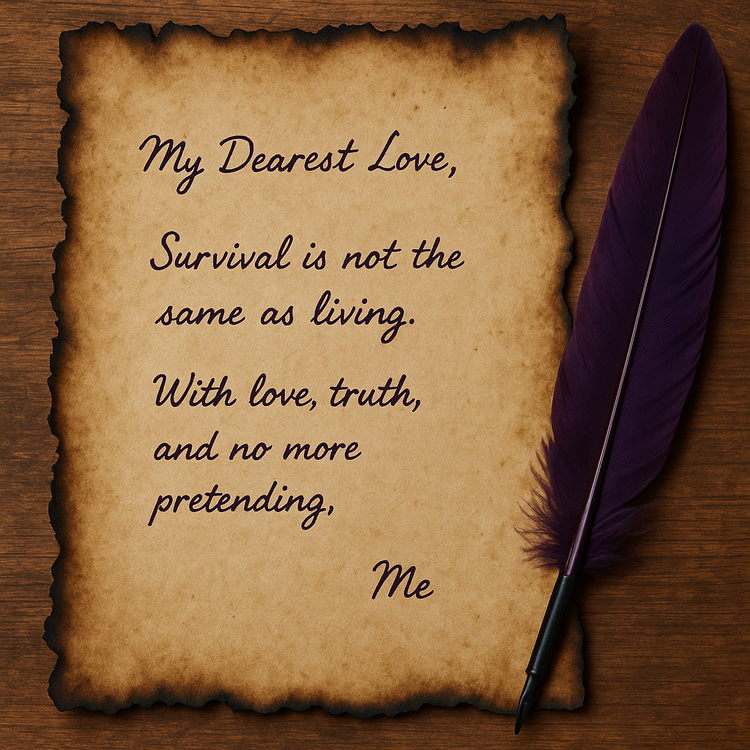I Hate Broccoli, But I Ate It

We were seated at a chic restaurant in Manhattan — the kind where the bread comes warm, the butter arrives sculpted, and the menu doesn’t list prices.
I had taken the 6 am train from DC, clutching a dossier that outlined the organization’s impact, priorities, and return on investment. I was late thirty-something and exhausted, dressed in what I had been told years before was the uniform of professionalism. Heels, a tailored dress, tidy hair, and the discomfort of shapewear hugging me like the secrets I was holding. I was there to raise money. Real money.
She was already seated when I arrived. A wealthy donor, old New York money. The kind of socialite who could cut a check for a million dollars without blinking. She wore a fleece jumpsuit, slouchy, pale blue, and unbothered, and unnamed sneakers. Her hair was pulled back in a loose ponytail, no makeup, no urgency. It was the middle of a weekday, and she had nothing to prove. I, on the other hand, was in costume.
I had been coached on how to pitch this meeting. Smile. Don’t sound too desperate. Use their name often. Make it seem like they’re the hero. Be relatable but not too familiar. And above all, don’t do anything to make them uncomfortable.
When the waiter came to take our order, I played it safe. I ordered something light, respectable, non-messy, non-fatty, something that wouldn’t risk judgment. She ordered lightly too, a modest dish with a side of steamed vegetables. The plates arrived, she looked at hers, picked up a few pieces of broccoli with her fork, and then casually offered the rest to me. “Please have some” she said, already sliding the plate toward me like we were old friends sharing lunch.
I smiled and nodded, saying yes before my body could say no. I hate broccoli. Not in the “not my favorite” way. I hate the way it smells, the way it tastes, the way it lingers in your mouth like regret. It makes my stomach churn. Even as a kid, broccoli was the vegetable I would try to bury under mashed potatoes or willing to get in trouble for not finishing my plate. But there I was smiling, nodding, chewing through nausea.
I ate it. Because I needed that check. Because my job was to make her feel good about giving. Because I believed that if I played the part well enough, she’d reward the organization, and maybe I’d be rewarded too. That lunch ended with a verbal commitment for a seven-figure donation. It was a big deal. Everyone called it a win.
What no one talked about was the invisible price tag of that win.
The hours of emotional labor leading up to that moment. The mental gymnastics of code-switching, class-blending, and micro-calibrating every part of myself to not seem too much or too little. I walked away from that lunch with a forced smile and a stomach in unfamiliar territory that lasted for hours. And it wasn’t the broccoli.
It was the realization that this work often required a kind of betrayal. Not just of personal preference, but of personhood. In the nonprofit world, we’re taught that sacrifice is noble. That discomfort is proof of commitment. That whatever we have to do to secure the check is worth it because it’s “for the people.” But I’ve come to understand that martyrdom is not a business model. It’s a trap. And too often, it’s holding the line, performing grace while kneading yourself into something digestible.
That million-dollar gift helped fund programs. But it also solidified a pattern: contorting myself for access, calling it strategy, and ignoring the erosion underneath. The older I get, the more I interrogate the moments I was praised for my professionalism. I realize now that many of those moments were actually acts of self-abandonment dressed up as success.
I don’t eat broccoli anymore. Not because I can’t, but because I won’t. I won’t ignore the signals my body gives me. I won’t shape-shift to soothe power. I won’t mistake proximity for progress or power. And I won’t pretend that the money justifies the means when the means cost me in the end. These days, I’m more interested in nourishment than performance. Not just in food, but in work. In relationships. In values. In voice.
If I sit across from someone now, whether it’s a donor, a collaborator, or a stranger, I want to show up whole. Not desperate. Not apologetic. Not costumed. Just me. Broccoli-free.
This resonated? Subscribe for more like this, directly from me to you. subscribe




Comments ()